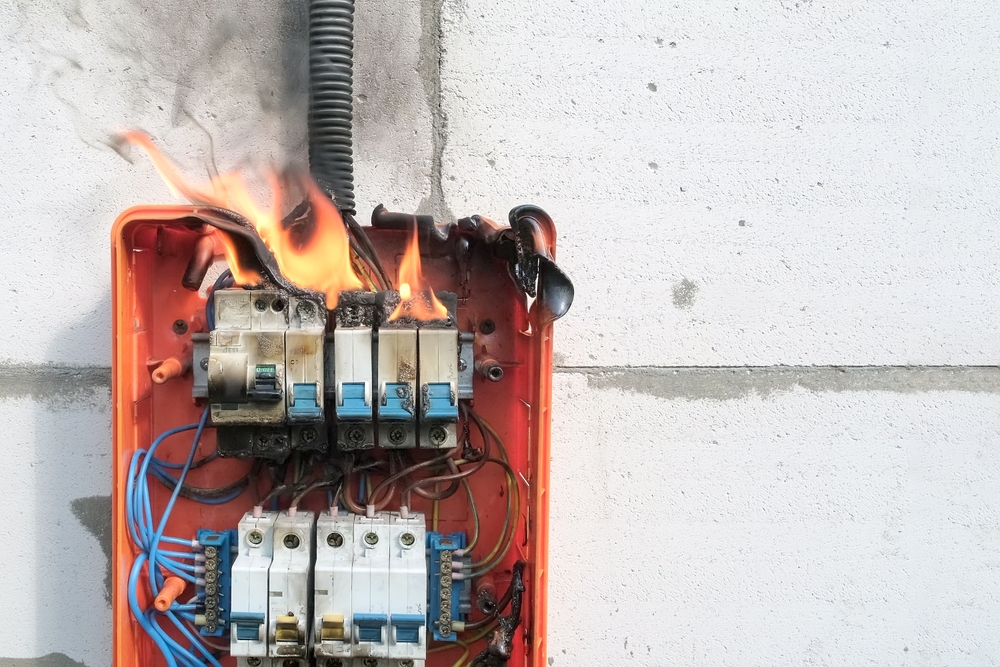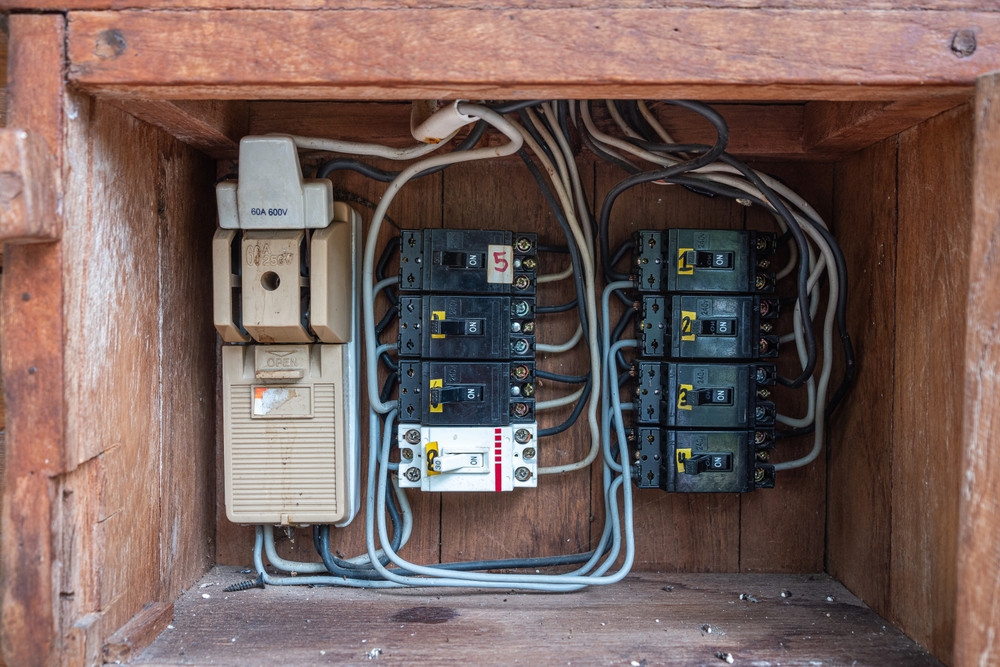Panel Upgrades
Panel upgrades replace outdated breaker boxes with modern electrical panels. This ensures your system can handle higher loads without tripping breakers or creating fire hazards.
Electricity is a fundamental part of our daily lives, powering everything from our kitchen appliances to our home entertainment systems. Yet, it’s something most people rarely think about—until something goes wrong. One critical component of your home or office’s electrical system that deserves attention is the breaker panel. But where is it located, and why is it so important?
Residential Breaker Boxes
An electrical circuit breaker panel, often referred to as a breaker box, serves as the central distribution hub for all the electricity that flows into your home. This crucial component channels power to every appliance and device, including lights, computers, refrigerators, stoves, and heating and air conditioning systems. It plays a vital role in ensuring that each of these appliances receives the appropriate amount of electricity needed to function efficiently and safely.
However, while these panels are essential for the smooth operation of your electrical system, they can pose significant hazards if not properly sized, installed, or maintained. Overloading a circuit can lead to tripped breakers, and in severe cases, electrical fires. Regular inspections and proper maintenance are key to preventing safety issues and ensuring that your electrical system operates reliably.
Commercial Breaker Boxes
Just as residential properties require attention to their breaker panels, businesses must also invest in commercial breaker boxes to ensure the smooth operation of their electrical systems. These panels are designed to handle a higher load, accommodating the numerous devices and machinery common in commercial settings, from office equipment to industrial machinery. A commercial breaker box not only ensures efficient power distribution but also enhances safety by minimizing the risk of overloads and potential fires. Regular maintenance and timely upgrades can prevent outages and ensure compliance with safety regulations, ultimately safeguarding a business’s operations and bottom line.
Reasons You Might Need a New Breaker Panel
1. Undersized Breaker Boxes
Undersized breaker boxes are commonly found in older buildings. When these structures were first constructed, the electrical needs were considerably lower. Over time, as you’ve added modern appliances and devices, the electrical load has increased substantially. This can leave the junction inadequate, potentially leading to outages, sparks, and even fires. Signs that your breaker panel might be undersized include frequent circuit breaker trips, flickering lights, and an inability to run multiple appliances simultaneously.
2. Oversized Breakers
While undersized breaker boxes are a concern, oversized breakers pose their own set of dangers. If a breaker is too large for the wire it is protecting, a direct short can cause the breaker to fail, producing a severe shock hazard or even starting a fire. Oversized breakers do not trip as they should during an overload, allowing excessive current to pass through the electrical system, which can overheat the wires and cause dangerous conditions.

Additional Reasons to Consider an Upgrade to Your Breaker Box
Outdated Technology
Breaker panels that were installed several decades ago may lack the advanced safety features and functionalities found in modern systems. For instance, newer panels are engineered to handle today’s increased electrical demands more efficiently and securely, ensuring that your home can support all of your electronic devices without risk of overload. Upgrading to a modern breaker panel not only enhances overall performance but also provides you with advanced features such as AFCI (Arc Fault Circuit Interrupter) and GFCI (Ground Fault Circuit Interrupter) protection. These technologies significantly improve the safety of your electrical system by reducing the risk of electrical fires and preventing electric shock, respectively, giving you greater peace of mind in your home.
Home Renovations
If you’re planning a major renovation or addition to your home, updating your breaker panel is often a necessary step to support the increased electrical load that comes with new appliances and systems. This is especially true if you are adding high-demand appliances such as a central air conditioning system, which can consume a substantial amount of power, or an electric vehicle charging station, which requires a dedicated circuit. Ensuring your breaker panel is equipped to handle these additional loads will not only enhance the functionality of your home but also prevent potential electrical issues down the line.
Compliance with Current Codes
Electrical codes are regularly updated to reflect improvements in safety standards and electrical technology. An outdated breaker panel may not comply with current building codes, which can pose significant challenges if you plan to sell your home in the future. Prospective buyers may be deterred by the prospect of having to upgrade the electrical system themselves, which could lower your property’s appeal and market value. Bringing your electrical system up to code not only ensures the safety of your home for you and your family but can also enhance your property’s value, making it a wise investment for the future. Upgrading your breaker panel is a proactive step that aligns with both safety and aesthetic improvements in your home.
How to Check Your Breaker Panel
If you’re unsure about the state of your breaker panel, it’s crucial to consult a licensed electrician. Here are some steps they might take to assess your system:
- Visual Inspection: This involves a thorough examination of the panel and its components for any visible signs of damage or wear. Look for issues such as rust, corrosion, or burn marks that could indicate underlying problems. A close inspection can help identify potential hazards before they escalate.
- Load Testing: This crucial step entails measuring the electrical load on each circuit to ensure that none are overloaded, which can lead to overheating and potential electrical fires. By assessing the current draw and comparing it with the circuit’s rated capacity, you can ensure safe and optimal performance.
- Code Compliance: It’s vital to verify that your electrical panel adheres to the latest electrical codes and safety standards. This includes checking for proper labeling, secure connections, and adherence to local regulations. Ensuring compliance not only enhances safety but also protects your property and ensures the reliability of your electrical system.
Contact Scott Electric for Expert Assistance
If you have any questions or concerns about the breaker panel in your home or commercial building, don’t hesitate to reach out to Scott Electric. Our team of licensed, professional electricians in Columbia, MO is dedicated to ensuring your electrical distribution channels are properly sized and safe. We bring years of expertise and a commitment to quality service, making us a trusted choice for all your electrical needs.
Contact us today to schedule an inspection or consultation and ensure your electrical system is operating safely and efficiently. Your safety and satisfaction are our top priorities.

Does Your Breaker Panel Need an Upgrade? Contact us today.
Upgrading your breaker panel can modernize your system and improve overall safety. Continue improving your electrical knowledge by discovering the importance of properly managing spliced wires in junction boxes.

